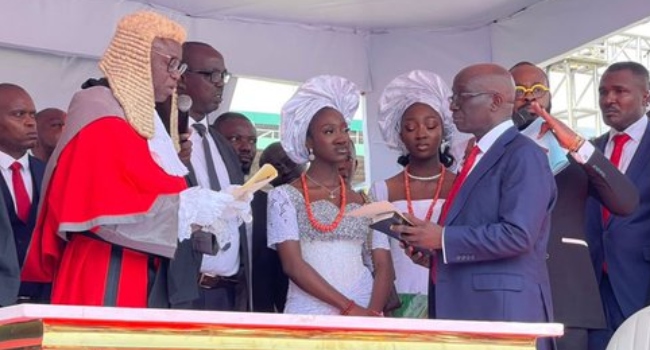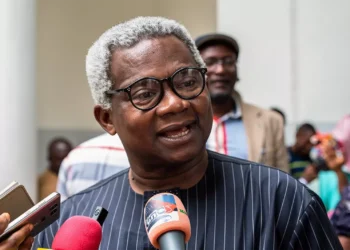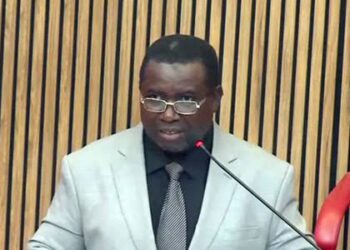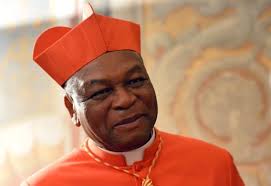Edo State’s newly inaugurated Governor, Monday Okpebholo, has set a bold tone for his administration, emphasizing an agenda centered on improving security, revamping infrastructure, enhancing healthcare services, ensuring food sufficiency, and reforming education. In his inaugural speech on Tuesday, Okpebholo highlighted his commitment to addressing these critical areas to foster sustainable growth and development across the state.
During the ceremony, which drew political leaders, traditional rulers, and citizens from various parts of the state, Okpebholo outlined his five-point agenda as a roadmap for tackling the challenges facing Edo. He pledged to focus on creating a secure and conducive environment for businesses and residents, signalling a new era of decisive governance.
Okpebholo made it clear that his administration’s top priority is to restore security in Edo, particularly addressing the rampant issues of kidnapping and violent crimes that have plagued the state in recent years. He noted the alarming rise in criminal activities, including highway robberies and kidnappings, which have caused fear among citizens and disrupted economic activities.
“The safety of our citizens is paramount,” Okpebholo stated. “We cannot achieve any meaningful development without first ensuring the security of our people. The era of criminals running rampant in Edo is over. We will deploy all necessary resources to curb these threats and restore peace to our communities.”
To this end, the governor pledged to work closely with security agencies and local vigilante groups, introducing new measures to strengthen intelligence gathering and quick response capabilities. He also plans to introduce community policing initiatives, allowing local leaders to play a greater role in maintaining security within their areas.
Addressing the state’s deteriorating infrastructure, Okpebholo acknowledged that the poor condition of roads and bridges has significantly hindered economic growth. He described the current state of infrastructure as a major impediment to the free movement of goods and services, affecting traders, commuters, and businesses.
“Our roads are in deplorable condition, making it difficult for people to travel from one part of the state to another,” Okpebholo said. “This is unacceptable, and we are ready to commence immediate rehabilitation work to make our roads passable again.”
The governor’s infrastructure plan includes the construction of new roads, bridges, and drainage systems to alleviate flooding issues that have become a recurring problem during the rainy season. He also emphasized the importance of collaborating with the Federal Government, private investors, and international partners to fund these projects and ensure their timely completion.
Governor Okpebholo highlighted healthcare as a cornerstone of his administration’s agenda, acknowledging the need for improved medical facilities and services to meet the growing demands of the population. He pledged to revamp existing health centers, equip them with modern medical tools, and ensure skilled healthcare professionals are readily available to provide quality services.
He stressed the importance of tackling malnutrition and promoting food security, vowing to support farmers with resources and training to boost local food production. “Agriculture is the backbone of our economy, and we must invest in it. We will provide farmers with the necessary support, including access to credit facilities, improved seeds, and training programs to increase their yields,” he noted.
The governor’s administration also plans to launch initiatives that support small and medium-scale enterprises (SMEs) in the agriculture sector, aiming to make Edo a hub for food production in Nigeria.
Education reform is another key focus area for Governor Okpebholo. He pointed out the alarming state of many schools in Edo, noting that poor facilities and a shortage of teachers have contributed to declining academic standards.
“We must invest in our education system if we want to secure the future of our children,” Okpebholo stated. “Our administration will immediately begin recruiting qualified teachers and renovating dilapidated school buildings to provide a conducive learning environment for students.”
He also emphasized the need to strengthen tertiary education, pledging to upgrade existing institutions and introduce new courses that align with the current job market demands. By doing so, he aims to equip students with skills that will enhance their employability and contribute to the state’s economic growth.
Governor Okpebholo made a strong appeal to all stakeholders, including traditional leaders, business owners, civil society organizations, and residents, to work with his administration in achieving its developmental goals. He assured that his government would maintain an open-door policy, welcoming ideas and suggestions from all quarters.
“We cannot achieve these ambitious goals without the collective effort of every Edo citizen,” he said. “I urge everyone to join hands with us as we embark on this journey to transform our state. Together, we can build an Edo that is secure, prosperous, and full of opportunities for all.”
In a bid to foster transparency and good governance, Okpebholo announced plans to strengthen the state’s anti-corruption mechanisms. He vowed to hold public officials accountable and ensure that government projects are executed efficiently and transparently.
To reinforce this commitment, the governor proposed setting up an independent panel to investigate past irregularities, including the controversial failure to inaugurate 14 members of the state House of Assembly in 2019. He also pledged to work closely with other arms of government to uphold democratic principles and deliver on his campaign promises.
In his closing remarks, Okpebholo expressed gratitude to the people of Edo for their support and reiterated his commitment to delivering on his promises. “I am here to serve, and together, we will build a better Edo State. We will not betray the trust you have placed in us,” he concluded.




































